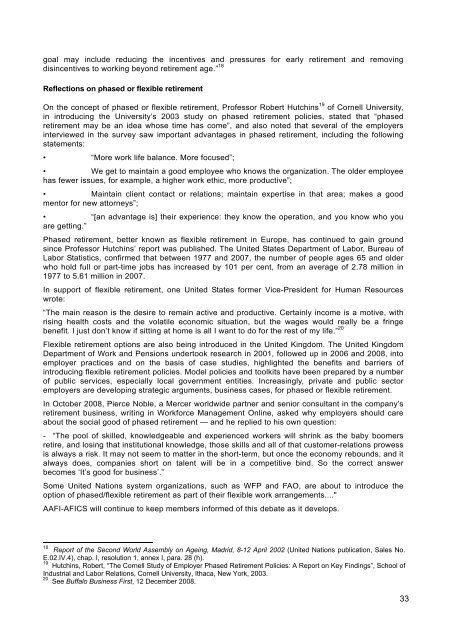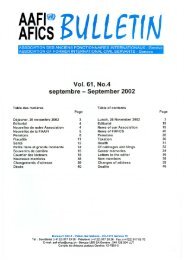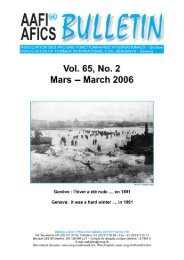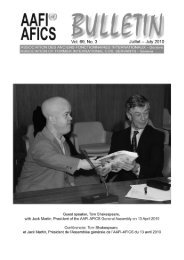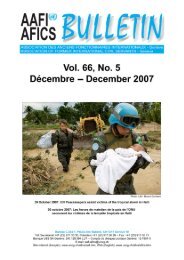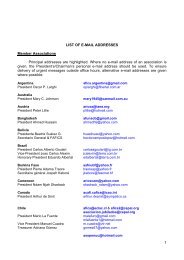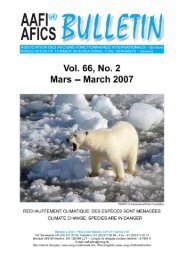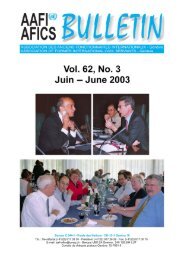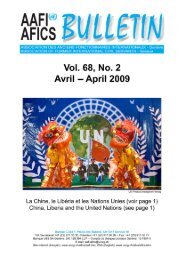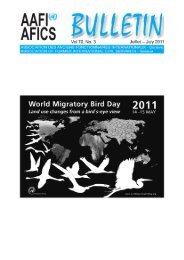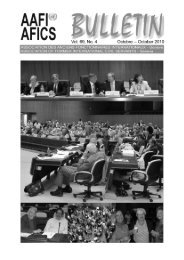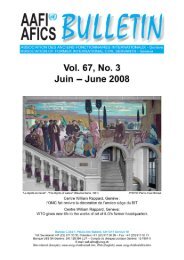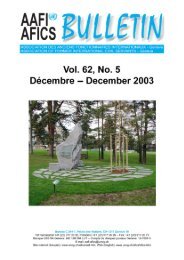octobre 2009 - aafi-afics - UNOG
octobre 2009 - aafi-afics - UNOG
octobre 2009 - aafi-afics - UNOG
- TAGS
- octobre
- unog
- afics.unog.ch
Create successful ePaper yourself
Turn your PDF publications into a flip-book with our unique Google optimized e-Paper software.
goal may include reducing the incentives and pressures for early retirement and removing<br />
disincentives to working beyond retirement age.” 18<br />
Reflections on phased or flexible retirement<br />
On the concept of phased or flexible retirement, Professor Robert Hutchins 19 of Cornell University,<br />
in introducing the University’s 2003 study on phased retirement policies, stated that “phased<br />
retirement may be an idea whose time has come”, and also noted that several of the employers<br />
interviewed in the survey saw important advantages in phased retirement, including the following<br />
statements:<br />
• “More work life balance. More focused”;<br />
• We get to maintain a good employee who knows the organization. The older employee<br />
has fewer issues, for example, a higher work ethic, more productive”;<br />
• Maintain client contact or relations; maintain expertise in that area; makes a good<br />
mentor for new attorneys”;<br />
• “[an advantage is] their experience: they know the operation, and you know who you<br />
are getting.”<br />
Phased retirement, better known as flexible retirement in Europe, has continued to gain ground<br />
since Professor Hutchins’ report was published. The United States Department of Labor, Bureau of<br />
Labor Statistics, confirmed that between 1977 and 2007, the number of people ages 65 and older<br />
who hold full or part-time jobs has increased by 101 per cent, from an average of 2.78 million in<br />
1977 to 5.61 million in 2007.<br />
In support of flexible retirement, one United States former Vice-President for Human Resources<br />
wrote:<br />
“The main reason is the desire to remain active and productive. Certainly income is a motive, with<br />
rising health costs and the volatile economic situation, but the wages would really be a fringe<br />
benefit. I just don’t know if sitting at home is all I want to do for the rest of my life.” 20<br />
Flexible retirement options are also being introduced in the United Kingdom. The United Kingdom<br />
Department of Work and Pensions undertook research in 2001, followed up in 2006 and 2008, into<br />
employer practices and on the basis of case studies, highlighted the benefits and barriers of<br />
introducing flexible retirement policies. Model policies and toolkits have been prepared by a number<br />
of public services, especially local government entities. Increasingly, private and public sector<br />
employers are developing strategic arguments, business cases, for phased or flexible retirement.<br />
In October 2008, Pierce Noble, a Mercer worldwide partner and senior consultant in the company’s<br />
retirement business, writing in Workforce Management Online, asked why employers should care<br />
about the social good of phased retirement — and he replied to his own question:<br />
- “The pool of skilled, knowledgeable and experienced workers will shrink as the baby boomers<br />
retire, and losing that institutional knowledge, those skills and all of that customer-relations prowess<br />
is always a risk. It may not seem to matter in the short-term, but once the economy rebounds, and it<br />
always does, companies short on talent will be in a competitive bind. So the correct answer<br />
becomes ‘It’s good for business’.”<br />
Some United Nations system organizations, such as WFP and FAO, are about to introduce the<br />
option of phased/flexible retirement as part of their flexible work arrangements...."<br />
AAFI-AFICS will continue to keep members informed of this debate as it develops.<br />
18<br />
Report of the Second World Assembly on Ageing, Madrid, 8-12 April 2002 (United Nations publication, Sales No.<br />
E.02.IV.4), chap. I, resolution 1, annex I, para. 28 (h).<br />
19<br />
Hutchins, Robert, “The Cornell Study of Employer Phased Retirement Policies: A Report on Key Findings”, School of<br />
Industrial and Labor Relations, Cornell University, Ithaca, New York, 2003.<br />
20<br />
See Buffalo Business First, 12 December 2008.<br />
33


